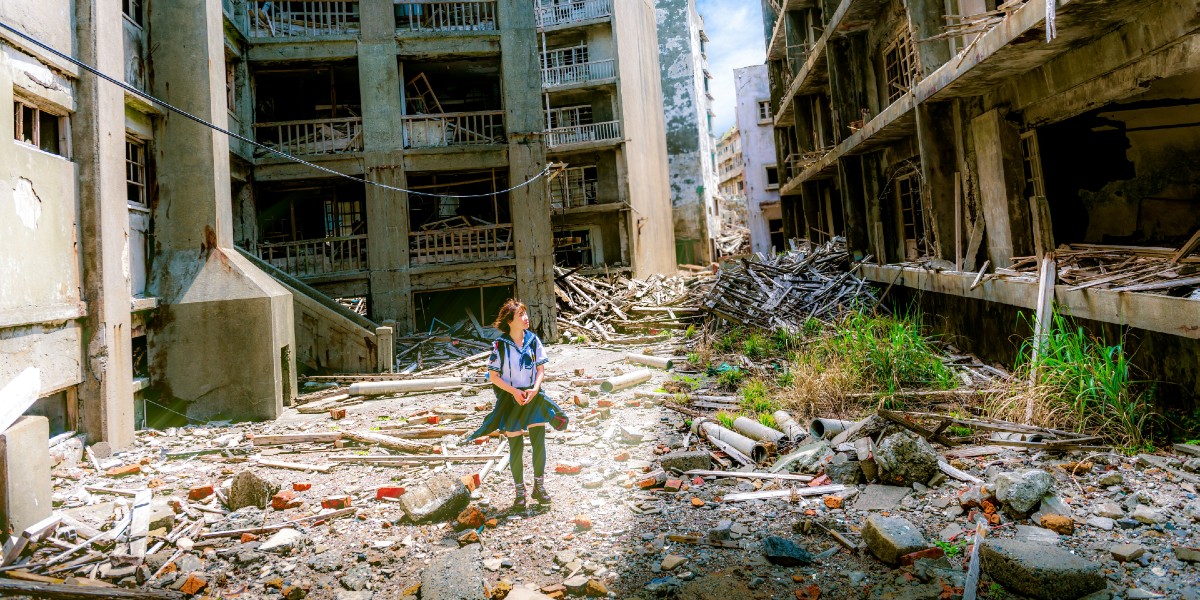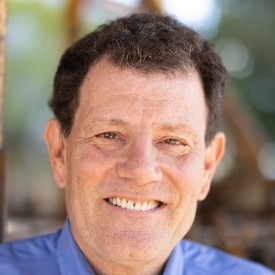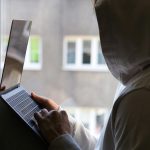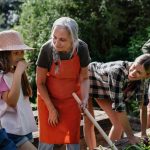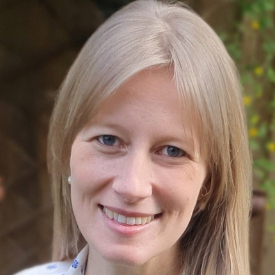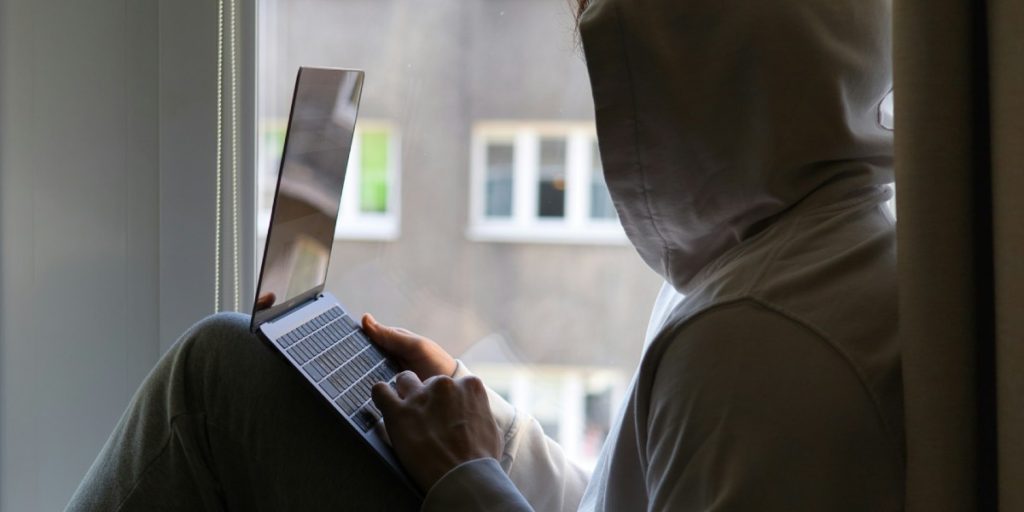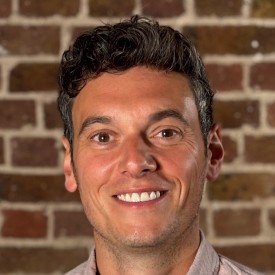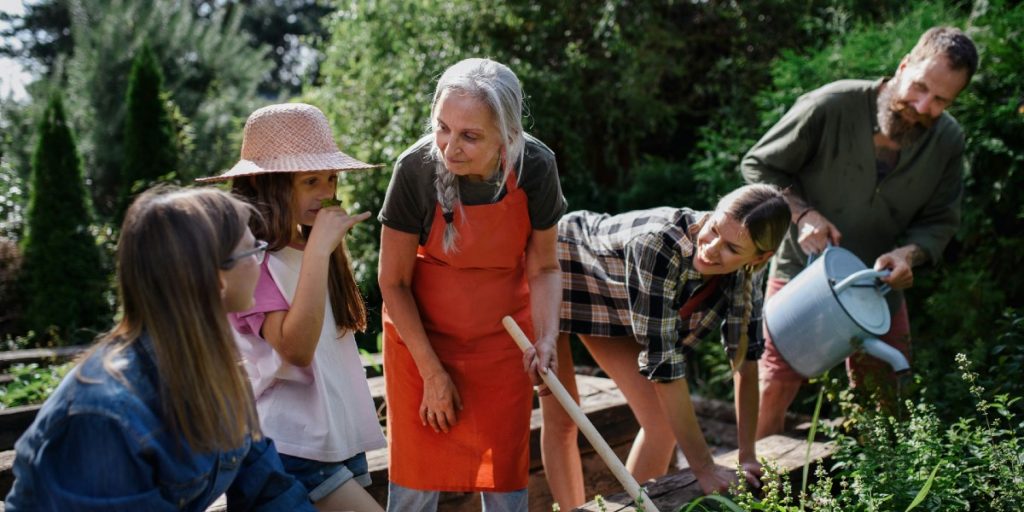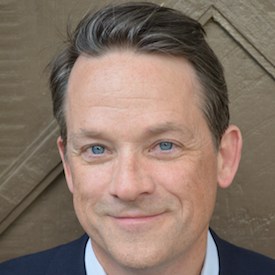Nicholas Kristof is a farm boy from Oregon, a globetrotting op-ed columnist for The New York Times, a dad, and a maker of wine and cider. He was previously bureau chief for The New York Times in Hong Kong, Beijing, and Tokyo. He is co-author, with his wife, of five previous books: Tightrope, A Path Appears, Half the Sky, and China Wakes. He has been awarded two Pulitzer Prizes, one with WuDunn in 1990 for their coverage of China, and the second in 2006 for his columns on Darfur.
Below, Nicholas shares five key insights from his new book, Chasing Hope: A Reporter’s Life. Listen to the audio version—read by Nicholas himself—in the Next Big Idea App.
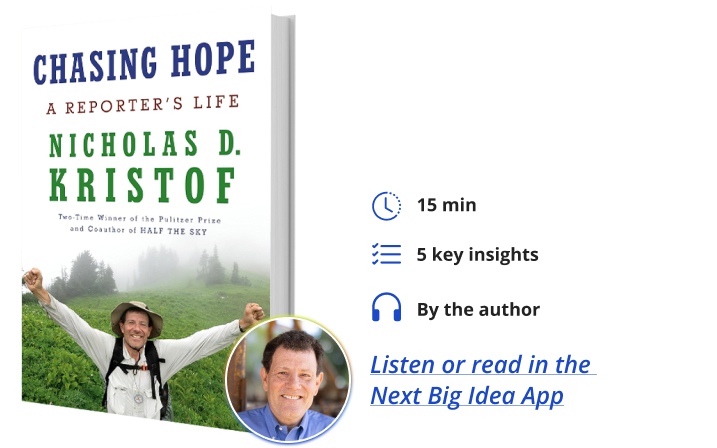
1. You most appreciate democracy when you don’t have it.
I came to this insight while covering the Tiananmen Democracy Movement in China in 1989. Looking back on that movement, I’m embarrassed that I was often a little scornful of those democracy protestors because they were peasants from the countryside or less-educated workers.
I wrote periodically, “They say they’re for democracy, but they can’t really define the kind of democracy they want. They can’t describe the institutions they would create or the guardrails that would make it work.” That was true, but on that terrible night of June 3rd to 4th, 1989, when the People’s Liberation Army sent troops to Tiananmen Square to massacre the student protestors, I will never forget the courage of those peasants and workers. I, on the other hand, stood among them and cowered as the troops opened fire. The bravest people were the rickshaw-driving peasants. Whenever there was a lull in the firing, they would drive toward the troops to pick up the bodies of kids who had been killed or injured and rush them to the hospitals.
There was a narrow two-lane road leading into Tiananmen Square that the army used to send truckloads of troops to kill more students. A bus driver saw the convoy of troops arriving, and he hurriedly parked his bus across the road to block it. It’s dark. There’s a grassy verge on both sides of the road. An officer stepped out of the lead truck and told him to move the bus, but the bus driver—this salt of the earth, middle-aged man—said no. The officer pointed his sidearm at the bus driver and repeated, Move the bus. The bus driver had turned off the engine already and was holding the keys in his hand. He looked at those truckloads of troops and hurled the bus keys as far as he could into that high grass beside the road.
That bus driver and those rickshaw drivers might not have been able to define democracy, but they were willing to die for it. I think that’s because they didn’t get to enjoy democracy. They knew how valuable it was for themselves and for their children. We in this country have much to learn from them.
2. Be skeptical even of victims, even of the good guys.
That massacre in Beijing probably claimed 400 to 800 lives, and maybe 5,000 people were injured. But there were many reports, including from supposed eyewitnesses, that tens of thousands of people had been killed, and Tiananmen Square was knee-deep in blood. I knew that was not true. I had seen people massacred, but it wasn’t many thousands of people. I realized then that when people have seen terrible things, they want to fight back. So, they exaggerate. They say they saw things in person when they only heard rumors about it. It is hard to be skeptical not only of those committing the massacres—the bad guys—but also of the good guys, the victims.
3. You won’t ever have things all figured out—the world is just too complicated.
Whenever you think you have things all figured out, that’s when you will probably fall flat on your nose and realize that the world is way more complicated than you think. I learned that in China when my wife and I moved into the Beijing Bureau Chief residence. We knew that the rooms were bugged, but we didn’t know where the bugs were located. A friend pointed to this little cubby hole in the wall, covered by a screen, and said, That’s where the bugs are. I thought, I’ll get to the bottom of this.
“I hope that it modified the hubris that we sometimes bring to foreign countries, this tendency to rush around and declare what is happening with great authority.”
I pried off the screen and saw electronic gadgetry. I was so proud of myself for recognizing the Chinese characters on the edge-most device: they read “electronic sound carrying device.” I had just arrived in Beijing and already found the bugs. Moments later, a friend arrived at the front door and we learned what “electronic sound carrying device” means in Chinese: A doorbell buzzer. That was a useful lesson. I hope that it modified the hubris that we sometimes bring to foreign countries, this tendency to rush around and declare what is happening with great authority.
It’s a useful lesson for journalists and foreign correspondents, but also for all citizens. Invariably, everything is more complicated than it seems. Whenever you feel too sure of yourself, be wary because it’s probably way more complicated than a simple glib solution.
4. We all have the power to make a difference.
I talk to a lot of people (young people in particular) who feel kind of paralyzed. They see all these problems, and they feel like they can’t make a difference. They want to leave a better world but don’t see how they can help. I understand them but disagree with their thinking. People think they need to solve a problem to make a difference. Solving problems is hard. For instance, there are millions of girls globally who need an education, and we won’t be able to get them all into schools. But it’s a mistake to think that we need to solve a problem entirely to make a difference.
In Chasing Hope, I write about my dad, a World War II refugee from Eastern Europe. He survived attacks from the Nazis (who killed some of his family) and from the Soviet communists (who killed more of his family). He was in a concentration camp. He was almost executed but managed to go to France with the help of a French diplomat. Then, he wanted to come to the U.S. because he saw it as the land of opportunity. In 1952, some families in Portland, Oregon, and the first Presbyterian Church sponsored his journey to America. That did not solve the global refugee problem. It didn’t even make a dent in the global refugee problem, but it was completely transformative for my dad and me. I exist because of their help.
That’s the kind of thing any of us can do. We can help an individual refugee family or a particular girl in a country like Ghana, Tanzania, or Zimbabwe who wants an education, for maybe less than a hundred dollars a year. So, never feel powerless. Making a difference and changing lives is an incredible gift we can all enjoy.
5. Alongside the worst of humanity, you find the very best.
I’ve spent a career covering war, massacres, disease, and poverty. When people first meet me, they assume I must be a depressing journalist. The truth is that I’ve emerged from covering war and genocide as an upbeat person. I’ve seen the worst that people can do, and there’s no denying that there is evil out there, but I’ve also seen the human capacity for goodness, decency, and strength. And I have seen an arc of moral progress in my time as a journalist. I’ve seen Apartheid collapse. I’ve seen the collapse of Communist rule in Eastern Europe. I’ve seen authoritarian regimes collapse in Taiwan, South Korea, and Indonesia.
Maybe the worst thing that can happen to somebody is to lose a child. When I graduated from college, 11 percent of children died before age five. Now, that number is down to a little more than three percent—the lowest child mortality rate in human history. When I was a kid, a majority of human beings were illiterate. Now, we’re pushing 90 percent adult literacy. Roughly 300,000 people emerged from extreme poverty in my lifetime. But it’s not just the numbers; I’ve seen the changes.
“I’ve seen the worst, but I’ve seen even more of the human capacity for goodness, strength, courage, and decency.”
Let me leave you with a story about a friend of mine in Pakistan, Mukhtar. When Mukhtar was a young woman, she was sentenced by the village council of Meerwala to be gang raped as punishment for something that her brother supposedly had done. The village council carried out the gang rape, and they expected that Mukhtar would then kill herself out of shame. Instead, she prosecuted her attackers and sent them to prison. She used her compensation money to start the first school in her village. Then, she enrolled the children of her attackers in that school because she believed the best way to chip away at misogyny and cruelty was by educating people.
All around us, unbearable evil oppresses people. But side by side with that evil, you find the best of humanity as well. That is what I take away from my career. I’ve seen the worst, but I’ve seen even more of the human capacity for goodness, strength, courage, and decency. We all have the capacity to tap into that and make this a better world.
To listen to the audio version read by author Nicholas Kristof, download the Next Big Idea App today:












